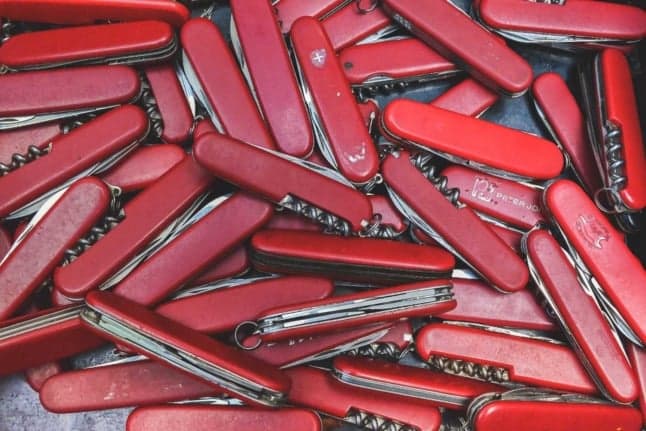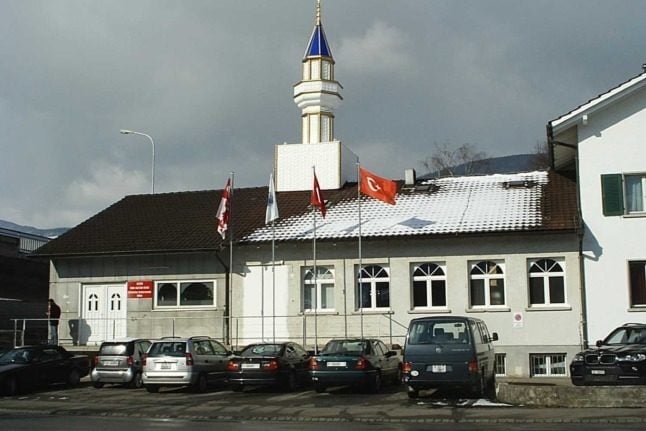The ten most unusual Swiss referendum topics

Switzerland’s direct democracy system means getting an issue to the polls has a relatively low threshold. Here are some of the more unusual examples in Swiss history.
Four times a year, the Swiss go to the polls to vote in referenda on all kinds of matters.
These can be issues of national significance like whether Switzerland will join the EU, or of local significance like whether a local bridge should be approved.
READ MORE: How Switzerland’s direct democracy system works
The threshold for a popular initiative - better known as a referendum - at a federal level can be as low as 100,000 signatures - while cantonal votes require far fewer autographs to be put to a vote.
From allowing local residents to vote in a referendum on whether individual people can become citizens (rejected), or whether to amend the constitution to give people a day off on August 1st, the Swiss like to vote on anything and everything.
The following is a list of some of Switzerland’s oddest, most unique and most Swiss referendum topics over the years.
No Swiss Army (and no Swiss Army knives?)
In 1989, Switzerland went to the polls to vote on the complete abolition of the military.
The fact that the military - and military service - still exist probably gives away the fact that the vote was rejected by the Swiss populace.
READ MORE: Do naturalised Swiss citizens have to do military service?
While the merits of pacifism in a nation utterly devoted to neutrality is probably worth an article in itself, it is worth wondering whether abolishing the Swiss Army would mean an end to one of the country’s most prominent non-cheese-related symbols: the Swiss Army knife.

Put it all on gold
One of the most persistent Swiss myths, which is at least in part influenced by the country’s conduct during the Second World War, is that the country’s wealth consists of gold hidden somewhere in the alps.
The spread of this myth was perhaps not helped by a 2014 nationwide vote which would have required the Swiss national reserve bank to hold a fifth of its wealth in gold (yes, actual gold).
Opponents of the vote argued it would lead to a dramatic spike in global gold prices, leading to economic chaos and political instability.
Proponents of the plan probably just liked shiny things.
Either way, the vote was rejected by 75 percent of voters - which in Switzerland is about as resounding as a referendum result can be.
Gold, secrecy and wealth: Six Swiss bank myths that need to be busted
Work free national day
Ever wished you could just get a bunch of friends together, sign a petition and call for a day off for the entire nation? Well in Switzerland, not only can you give it a try, but it will actually work.
Up until 1993, Switzerland’s National Day on August 1st was not a public holiday. A sizeable number of Swiss citizens saw a problem with this - and launched a referendum which was ultimately successful.
Since then, August 1st is a holiday each year across the entire country.
Porn, pizza and Lisa Simpson: The strange world of Swiss ballot papers
Fighter jets
It might sound odd to people from around the world – particularly Americans – but the Swiss even get a direct say in the purchase of military equipment.
In 2020, the Swiss government wanted to spend CHF6 billion ($USS6 billion) on new fighter jets - and had to take the issue to voters.
The vote was eventually approved by the thinnest margin possible: 50.1 percent, with just 9,000 votes nationwide separating the proposals.
READ MORE: Why is Switzerland holding a referendum on purchasing fighter jets?
No cars please, it’s Sunday
In 2003, Swiss voters went to the polls on a proposal which would have outlawed cars for four Sundays a year.
Unlike recent pro-pedestrian efforts, this radical proposal called for the country’s roads to be off-limits to private vehicles, meaning that everything other than buses, delivery vehicles and the police and fire brigades would have to stay in the garage.
The vote was rejected on a nationwide basis, although it did win narrow support in Switzerland’s largest metropolis: Zurich.
With several parts of the country wanting to go car-free or at least minimise disruption by cutting speed limits and expanding pedestrian spaces, it appears this vote was ahead of its time.
READ MORE: These parts of Switzerland are set to introduce a 30km/h speed limit
Referendum on naturalisation
The Swiss like to vote on everything, but having each municipality vote on whether or not people could become citizens was too much for Swiss voters.
While councils do sometimes vote on naturalisation, this would have required the anonymous participation of local residents. It failed.
READ MORE: The nine most surprising questions on Switzerland’s citizenship exam
No more miniarets
One of the more well-known Swiss nationwide votes came about in 2009, when the country went to the polls to ban minarets - i.e. the small towers often seen on mosques and other Islamic architecture.
The vote, which was supported by the right-wing Swiss People’s Party but opposed by the government, was particularly strange considering there were only four minarets in the country so far (which were excluded from demolition as the vote only related to new constructions).
The vote won with almost 60 percent support and was a precursor to 2021’s successful vote to ban religious face coverings, known colloquially as the ‘burka ban’.

A minaret in Wangen bei Olten, one of Switzerland's four minarets and the one which started the vote to ban them. By Nadf - Own work, Public Domain,
No horny cows and goats
An initiative from 2018 designed to stop Swiss farmers dehorning cows and goats has been rejected by voters at a referendum.
The initiative would have seen farmers who choose not to dehorn their cows and goats given extra subsidies to cover additional associated costs.
But 54.7 percent of Swiss voters rejected the initiative, according to official results published by the Swiss government.
READ MORE: Cow horn initiative rejected by Swiss voters
Animal lawyers
Switzerland’s penchant for an animal rights vote deserves its own section, given how commonly they take place for a country with relatively minimal native wildlife.
The first ever Swiss referendum concerned animal rights, while there are several more on the ballot at a national and cantonal level in 2022.
EXPLAINED: What was on the ballot in Switzerland’s first ever referendum?
One rejected 2010 vote called for animals to have legal representation (by human, not animal, lawyers).
Advocates of the plan said animals would be treated better if they had lawyers on their side. The vote called for a state-funded team of animal lawyers to prevent abuses against the fishy, the furry and the feathered.
The vote was rejected by 71 percent of the electorate, although only humans (and lawyers) were allowed to vote.
Monkeys should have human rights
Which brings us to… legally enshrined primate rights.
A northern Swiss region will vote Sunday, February 13th, on whether non-human primates should enjoy some of the same basic fundamental rights as their human cousins.
Swiss referendum: Will Basel voters give primates human rights?
The vote in the Basel-City canton, which is home to the city of the same name and to one of Europe's best-known zoos, is being keenly followed by animal rights activists.
Triggered by the campaign group Sentience under Switzerland's direct democracy system, the regional vote concerns whether to give primates the right to life and the right to "mental and physical integrity".
Early indications are the vote is likely to fail, although never rule out any last-minute monkey business in Switzerland.
For in depth coverage of Switzerland’s current, future and previous referenda, check out this link.
Did we forget a vote? Get in touch a [email protected].
Comments
See Also
Four times a year, the Swiss go to the polls to vote in referenda on all kinds of matters.
These can be issues of national significance like whether Switzerland will join the EU, or of local significance like whether a local bridge should be approved.
READ MORE: How Switzerland’s direct democracy system works
The threshold for a popular initiative - better known as a referendum - at a federal level can be as low as 100,000 signatures - while cantonal votes require far fewer autographs to be put to a vote.
From allowing local residents to vote in a referendum on whether individual people can become citizens (rejected), or whether to amend the constitution to give people a day off on August 1st, the Swiss like to vote on anything and everything.
The following is a list of some of Switzerland’s oddest, most unique and most Swiss referendum topics over the years.
No Swiss Army (and no Swiss Army knives?)
In 1989, Switzerland went to the polls to vote on the complete abolition of the military.
The fact that the military - and military service - still exist probably gives away the fact that the vote was rejected by the Swiss populace.
READ MORE: Do naturalised Swiss citizens have to do military service?
While the merits of pacifism in a nation utterly devoted to neutrality is probably worth an article in itself, it is worth wondering whether abolishing the Swiss Army would mean an end to one of the country’s most prominent non-cheese-related symbols: the Swiss Army knife.

Put it all on gold
One of the most persistent Swiss myths, which is at least in part influenced by the country’s conduct during the Second World War, is that the country’s wealth consists of gold hidden somewhere in the alps.
The spread of this myth was perhaps not helped by a 2014 nationwide vote which would have required the Swiss national reserve bank to hold a fifth of its wealth in gold (yes, actual gold).
Opponents of the vote argued it would lead to a dramatic spike in global gold prices, leading to economic chaos and political instability.
Proponents of the plan probably just liked shiny things.
Either way, the vote was rejected by 75 percent of voters - which in Switzerland is about as resounding as a referendum result can be.
Gold, secrecy and wealth: Six Swiss bank myths that need to be busted
Work free national day
Ever wished you could just get a bunch of friends together, sign a petition and call for a day off for the entire nation? Well in Switzerland, not only can you give it a try, but it will actually work.
Up until 1993, Switzerland’s National Day on August 1st was not a public holiday. A sizeable number of Swiss citizens saw a problem with this - and launched a referendum which was ultimately successful.
Since then, August 1st is a holiday each year across the entire country.
Porn, pizza and Lisa Simpson: The strange world of Swiss ballot papers
Fighter jets
It might sound odd to people from around the world – particularly Americans – but the Swiss even get a direct say in the purchase of military equipment.
In 2020, the Swiss government wanted to spend CHF6 billion ($USS6 billion) on new fighter jets - and had to take the issue to voters.
The vote was eventually approved by the thinnest margin possible: 50.1 percent, with just 9,000 votes nationwide separating the proposals.
READ MORE: Why is Switzerland holding a referendum on purchasing fighter jets?
No cars please, it’s Sunday
In 2003, Swiss voters went to the polls on a proposal which would have outlawed cars for four Sundays a year.
Unlike recent pro-pedestrian efforts, this radical proposal called for the country’s roads to be off-limits to private vehicles, meaning that everything other than buses, delivery vehicles and the police and fire brigades would have to stay in the garage.
The vote was rejected on a nationwide basis, although it did win narrow support in Switzerland’s largest metropolis: Zurich.
With several parts of the country wanting to go car-free or at least minimise disruption by cutting speed limits and expanding pedestrian spaces, it appears this vote was ahead of its time.
READ MORE: These parts of Switzerland are set to introduce a 30km/h speed limit
Referendum on naturalisation
The Swiss like to vote on everything, but having each municipality vote on whether or not people could become citizens was too much for Swiss voters.
While councils do sometimes vote on naturalisation, this would have required the anonymous participation of local residents. It failed.
READ MORE: The nine most surprising questions on Switzerland’s citizenship exam
No more miniarets
One of the more well-known Swiss nationwide votes came about in 2009, when the country went to the polls to ban minarets - i.e. the small towers often seen on mosques and other Islamic architecture.
The vote, which was supported by the right-wing Swiss People’s Party but opposed by the government, was particularly strange considering there were only four minarets in the country so far (which were excluded from demolition as the vote only related to new constructions).
The vote won with almost 60 percent support and was a precursor to 2021’s successful vote to ban religious face coverings, known colloquially as the ‘burka ban’.

No horny cows and goats
An initiative from 2018 designed to stop Swiss farmers dehorning cows and goats has been rejected by voters at a referendum.
The initiative would have seen farmers who choose not to dehorn their cows and goats given extra subsidies to cover additional associated costs.
But 54.7 percent of Swiss voters rejected the initiative, according to official results published by the Swiss government.
READ MORE: Cow horn initiative rejected by Swiss voters
Animal lawyers
Switzerland’s penchant for an animal rights vote deserves its own section, given how commonly they take place for a country with relatively minimal native wildlife.
The first ever Swiss referendum concerned animal rights, while there are several more on the ballot at a national and cantonal level in 2022.
EXPLAINED: What was on the ballot in Switzerland’s first ever referendum?
One rejected 2010 vote called for animals to have legal representation (by human, not animal, lawyers).
Advocates of the plan said animals would be treated better if they had lawyers on their side. The vote called for a state-funded team of animal lawyers to prevent abuses against the fishy, the furry and the feathered.
The vote was rejected by 71 percent of the electorate, although only humans (and lawyers) were allowed to vote.
Monkeys should have human rights
Which brings us to… legally enshrined primate rights.
A northern Swiss region will vote Sunday, February 13th, on whether non-human primates should enjoy some of the same basic fundamental rights as their human cousins.
Swiss referendum: Will Basel voters give primates human rights?
The vote in the Basel-City canton, which is home to the city of the same name and to one of Europe's best-known zoos, is being keenly followed by animal rights activists.
Triggered by the campaign group Sentience under Switzerland's direct democracy system, the regional vote concerns whether to give primates the right to life and the right to "mental and physical integrity".
Early indications are the vote is likely to fail, although never rule out any last-minute monkey business in Switzerland.
For in depth coverage of Switzerland’s current, future and previous referenda, check out this link.
Did we forget a vote? Get in touch a [email protected].
Join the conversation in our comments section below. Share your own views and experience and if you have a question or suggestion for our journalists then email us at [email protected].
Please keep comments civil, constructive and on topic – and make sure to read our terms of use before getting involved.
Please log in here to leave a comment.